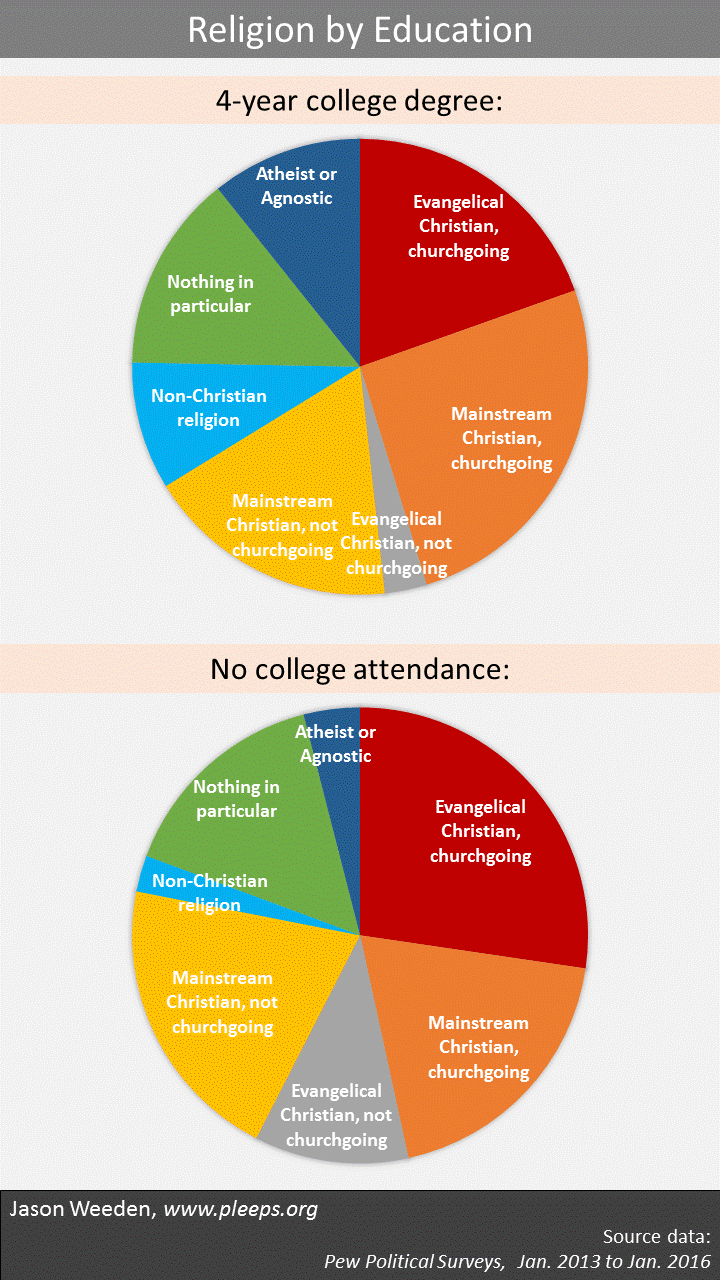I suspect that lots of people believe that college-educated Americans are less religious than others. The secular left sometimes views religion as a product of ignorance, expecting those with more education to be better able to break religion’s spell. The religious right sometimes agrees that there’s a link between higher education and reduced religiosity, but views it as a matter of brainwashing rather than spell-breaking—part of the professorial cabal’s secular indoctrination agenda.
But is it true that the college educated are less religious? Well, it depends on what measures we’re looking at.
If we focus on belief in God, there are real educational differences, with the college educated relatively more likely to be atheists, agnostics, or doubting believers. If we focus on the “born again or evangelical” distinction—or related areas like biblical literalism—the college educated are also less religious in the limited sense that their religious preferences are less evangelical or absolutist.
However, if we focus on how frequently people attend religious services, now the college educated don’t differ from the less educated in religiosity. As I’ve covered in previous posts, church attendance is mostly about restricted/unrestricted sexual lifestyles rather than education.
There’s also the matter of Christian vs. non-Christian religions. In particular, Jewish and Asian Americans (including lots of Buddhists, Hindus, etc.) are unusually likely to be college educated, contributing to higher percentages of non-Christians at higher education levels.
So there’s a lot going on here. Relative to non-college folks, the college educated are more likely to be atheists, agnostics, Jews, Buddhists, Hindus, etc., and less likely to be evangelical Christians, but equally likely to go to church. The Pew datasets provide a good opportunity to see all these things happening at once. In the charts below I show the basic religious breakdown for people with 4-year college degrees and for people with no college attendance. (To save space, I’m not showing the middle group, people with some college but not 4-year degrees, but, as one would expect, they’re in between the patterns of the two groups I show.)
 (Technical notes: The charts exclude people with missing religion information, <1% of the sample. The 4-year-degree group has 23,675 individuals and the non-college group has 17,953. Results are weighted. “Churchgoing” here means they report going to church “once or twice a month” or more. “Evangelical” means they indicated they’re “born again or evangelical” and “Mainstream” means they did not.)
(Technical notes: The charts exclude people with missing religion information, <1% of the sample. The 4-year-degree group has 23,675 individuals and the non-college group has 17,953. Results are weighted. “Churchgoing” here means they report going to church “once or twice a month” or more. “Evangelical” means they indicated they’re “born again or evangelical” and “Mainstream” means they did not.)
If there’s a general theme, it’s not the simple more/less one. Instead, it’s that the college educated are religiously diverse and polarized. There are relatively more non-traditional, non-Christian identities among the college crowd, but also a polarized tendency to be religious when religious and unreligious when unreligious. That is, lots in the non-college camp maintain a Christian label when they’re non-observant (something I suspect has to do with operating in social groups that tend more towards group-based discrimination, and wanting to be on the dominant side). The college educated are less likely to occupy this middle ground. Relative to non-college folks, when they have a religious identity they’re more often attending services, and when they don’t they’re more likely to move from the generic “nothing in particular” camp to the more declarative “atheist” and “agnostic” identities.
